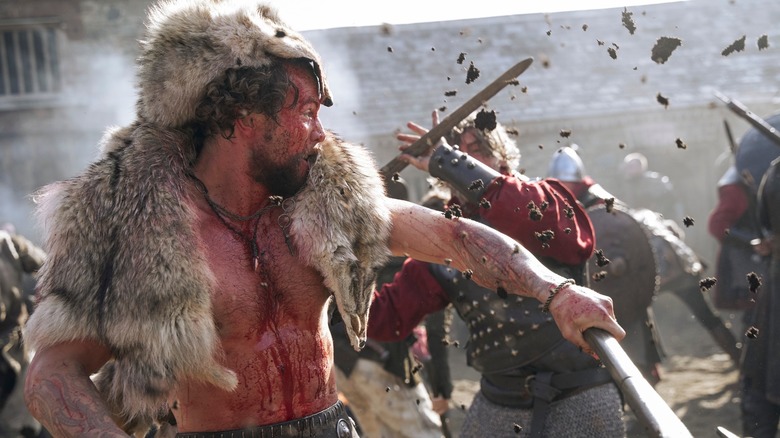
Netflix's "Vikings: Valhalla" is very keen to remind its audience that it's a sequel show -- especially in the early episodes, which are packed rather densely with name-dropping. Ragnar, Rollo, Lagertha, Bjorn, Ivar and numerous other characters are shoehorned into speeches with the subtlety of a falling axe.
To its credit, "Valhalla" also slips the message into these speeches that it's time to put the past behind us and focus on a new generation of heroes. But before we do that, it's worth looking back at the original "Vikings" -- which, in its prime, was better than even the golden years of "Game of Thrones." It's also worth acknowledging that, from its very beginnings, "Vikings" had several advantages that "Valhalla" does not have.
First, it had the pale-eyed intensity of Travis Fimmel as the legendary Viking Ragnar Lothbrok -- a powerful leading man whose raw talent kept "Vikings" afloat even during the times when the show floundered. And while Ragnar was surrounded by equally compelling characters like Lagertha, Athelstan, and Floki, the early seasons of "Vikings" greatly benefited from Ragnar as both an anchor point and a pair of curious eyes through which the audience could explore the world. It's generally agreed among "Vikings" fans that the quality of the show started to fall off after Ragnar's death in season 4, struggling to maintain its stability as the storyline's focus was split between Ragnar's surviving sons.
This is the starting position that "Vikings: Valhalla" finds itself in, with not just one protagonist, but three: Icelanders Leif Eriksson (Sam Corlett) and Freydis Eriksdottir (Frida Gustavsson), and Harald Sigurdsson (Leo Suter), a Christian Viking who finds himself being pulled between his newfound affection for Leif and Freydis, and his duties to God and to his half-brother, Olaf Haraldsson (Jóhannes Haukur Jóhannesson, who gave an outstanding performance in the Netflix sci-fi series "The Innocents" and is similarly a highlight of the "Valhalla" cast). Like the sons of Ragnar after his death, these characters, along with King Canute (Bradley Freegard), are united in season 1 by a common motive: revenge.
So, What's Happening In England?
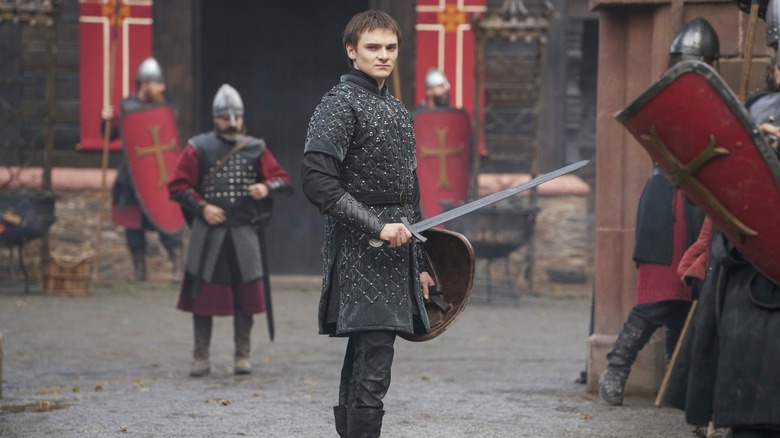
The story of "Vikings: Valhalla" begins with the ailing King Æthelred the Unready ordering the mass slaughter and purge of Danes, known as the St. Brice's Day massacre. The seeds of chaos sown, Æthelred basically says, "okay, good luck with all that!" and dies, leaving his son, Edmund (Louis Davison as the petulant young boy-king), to deal with the incoming Vikings. As was the case with Judith in "Vikings," the real schemer in the royal family isn't the king but the queen: Emma of Normandy (Laura Berlin), a descendant of Rollo who was a powerless piece of property in Normandy but has now amassed a great deal of wealth and power in her own right.
But perhaps the most quietly interesting character on the English shores of "Vikings: Valhalla" is Earl Godwin (David Oakes). In "Game of Thrones" terms he's kind of the Littlefinger of the group, but unlike Aiden Gillen's smirking schemer, what makes Godwin so lethal is his apparent air of humility. He bows his head to whomever he perceives to have the most power, and even when his schemes are revealed he explains himself calmly, with no gloating. There's something refreshingly honest about a character who is entirely self-interested, and who knows from experience just how fast the world can turn on you, and how quickly a comfortable royal court role can be stripped away and replaced with a seat at the executioner's block. Godwin is a traitor, but he's an equal opportunity traitor.
Needless to say, the Vikings are not happy about the St. Brice's Day massacre. The victories of the Great Heathen Army (which was led by Ragnar's sons to avenge his death) are invoked to inspire another massive alliance of Viking clans -- made all the more dangerous because their primary goal isn't goal or land, but to outright kill the king of England and take his throne.
The Avengers: Viking Edition
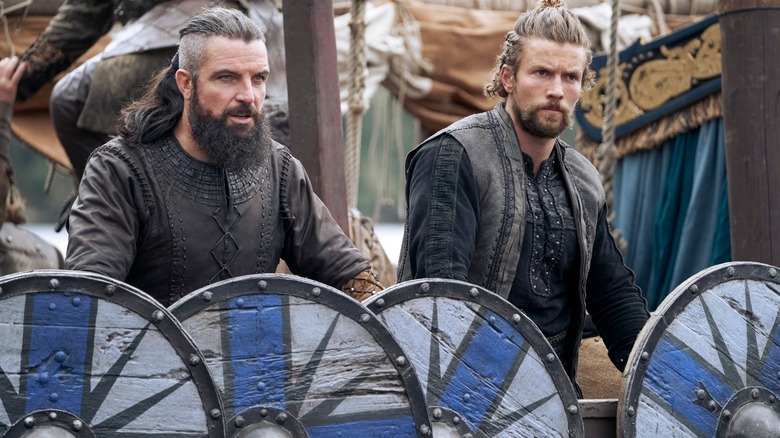
Of the three protagonist in "Vikings: Valhalla," Leif is the most Ragnar-like -- being a scruffy, weather-worn explorer from a humble background. But unlike Ragnar, Leif lacks agency and drive; he leaves Iceland not out of his own spirit of curiosity, but to avenge a crime committed against his sister, Freydis (escaping the shadow of his father, Erik the Red, is more of a perk than a conscious goal). Similarly, Leif joins the Vikings' war of revenge not out of any particular love of war or raiding, but to earn clemency for Freydis after she commits a crime. His character arc is mainly based around his identity as a "Viking" who has lived his entire life on an island far away from the rest of Scandinavia, and who -- in a way -- is now discovering his culture and his people for the first time.
Leif does start to take off as a character once he demonstrates his talent for battle strategy and realizes that, rather than returning home, he wants to stay and continue to build his reputation, so perhaps he'll become more compelling in "Vikings: Valhalla" season 2 (if the show gets renewed, that is). Harald similarly exists in a weird space where he's not that interesting yet, but you can see the seeds of a potentially great character arc in the tension surrounding his friendship with Leif and his alliance with Olaf. Harald's relationship with Freydis, on the other hand, isn't particularly engaging; it feels more like a means to fulfil a minimum sex scene quota, and both Harald and Freydis' stories are more interesting when they're not together.
Whereas "Vikings: Valhalla" is set at the end of the Viking Age in Britain, "Vikings" was set during the dawn -- which also meant that it had a much more interesting story to tell. Despite being the protagonist, Ragnar was an invader and an aggressor; his first great "battle" that we see him lead is the ruthless slaughter of defenseless monks at Lindisfarne. The power play is more complex than that, though; the viewers watching at home know, with the benefit of hindsight, that Ragnar has just toppled a domino that will eventually lead to the Christianization of Scandinavia. The Vikings may bite at the Christians in 793 AD, but the Church will eventually bite back a lot harder -- and that's the future we see in "Valhalla."
This future played out on a micro level in Ragnar's own relationship with religion. Though he initially mocks Athelstan's faith, he's also fascinated by it, driven by an insatiable hunger to learn more about the world ("Odin gave his eye to acquire knowledge," he tells Bjorn. "But I would give far more"). Ragnar later toys with Christianity like a cat with a mouse, allowing himself to be baptized as part of a long-term ploy to get inside the walls of Paris and pillage it. But once again, Ragnar allows himself to be pulled in deeper while striking at the enemy, and eventually he becomes torn between the Christian God and the Norse gods, believing in both equally. Then, at the end of his life, he expresses the cynicism of the atheist: suggesting to his old frenemy, King Ecbert, that both of their religions are merely tools with which to control their people.
To the Seer (the only "Vikings" character who returns in "Valhalla," by way of being a ghost), Ragnar delivers his final verdict after a lifetime of wrestling with religion: "Man is the master of his own fate, not the gods."
A Bit Too Star Wars
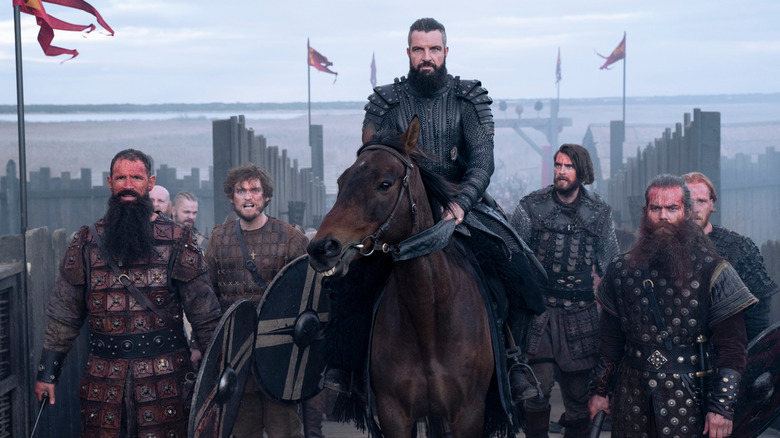
One of the benefits of "Vikings" being set at a time when neither the Norse gods nor the Christian god were particularly under threat from one another is that, unlike a lot of stories where there is a clash of faiths, the show didn't really make value judgments about either religion. Both had their sympathetic champions -- Ragnar for the Norse gods, and Athelstan for the Christian God -- and these champions didn't fight one another, but instead become close friends who regarded each other's personal mythologies with interest, not disgust. The gods also had their less sympathetic champions (oh, Floki...) but "Vikings" wasn't much interested in distinguishing the good guys from the bad guys. Its attitude towards the characters was essentially: "All of these people have been dead for a thousand years, so there's no point trying to make moral judgments about them now." This freed the writers up to focus instead on the push and pull of power, the politics, and the history itself.
"Vikings: Valhalla" season 1, meanwhile, is about the beginning of the end for the Vikings, and the climactic battle features a wild-eyed, crazy, murderous Christian monk leading a bloody purge of "heathens" from Norway. It's an electric performance from Asbjørn Krogh Nissen as Jarl Kåre, and there's a sense that "Valhalla" becomes more confident in its storyline once it starts pitting the designated heroes against an overtly villainous character. But once the show becomes about a group of plucky underdogs trying to resist the might of an expanding empire it all becomes a bit, well, "Star Wars." It's solidly entertaining, but it's also solidly clichéd, and it sacrifices nuance for simplicity.
The St. Brice's Day massacre of the opening episode, for example, feels like it was designed to draw comparisons to the "Red Wedding" episode of "Game of Thrones" (it's framed as a cowardly betrayal by the English of their trusting Danish allies). But I wish the show could have started earlier in the timeline and shown the real build-up to the St. Brice's Day massacre, which was actually the endpoint of decades of tension caused by Danes building their own settlements in England while elsewhere the Vikings continued to carry out raids on the country.
Since "Vikings" originated on the History channel, one of its greatest strengths was a genuine interest in history ... albeit with a lot of creative license for the sake of streamlined storytelling. "Vikings: Valhalla" shines when it embraces this jigsaw-puzzle approach of fitting fragments of historical events (for example, there really was a battle involving a bride outside London, but the pivotal maneuver was actually deployed by Æthelred against the Vikings) into its own story framework to create a fictional narrative infused with real history. Both the attack on London and the later attack on Kattegat demonstrate faith on the writers' part that historical military tactics -- drawing out leaders and cutting them off from their forces, tricking the enemy into splitting their army, communicating attack plans in coded messages, turning natural phenomena like the tides into an ally -- are interesting in their own right.
Have A Little Faith
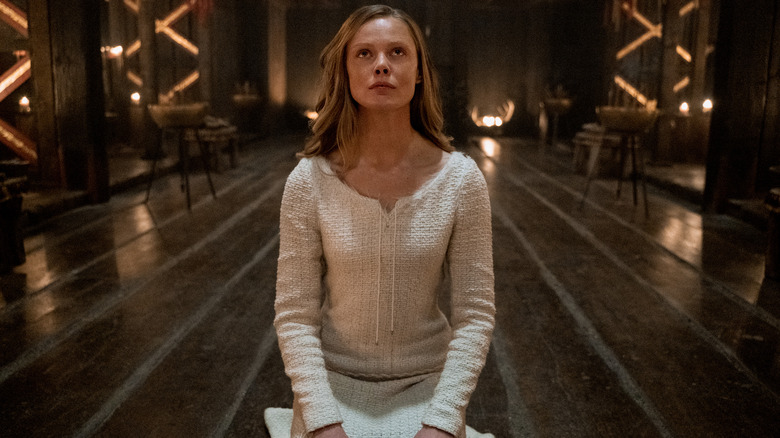
A common trope in historical fantasy is that magic is at its most powerful in primitive and medieval-coded times, but disappears from the world as civilization progresses until it eventually fades into legend. One thing that "Vikings: Valhalla" does well is to capture the sense of doom felt among characters who still worship the Norse gods, but can sense their imminent erasure by the wave of Christianization.
"Vikings" struck a magic-adjacent tone without ever confirming the existence of either the Christian God or the Norse gods; Ragnar had visions of Odin walking among the dead and of himself being denied at the gates of Valhalla, while Athelstan's wavering belief was restored when he received what he believed to be a sign from God. Were these things real? Did the gods send them? Or were they merely from the fever of imagination? As Ragnar observed at the end of his life, perhaps it doesn't matter.
In "Vikings: Valhalla," Jarl Kåre and Freydis are the vanguards of their respective belief systems. Jarl Haakon (Caroline Henderson), the current leader of Kattegat, senses the imminent fall of the old ways and sends Freydis to the Viking temple at Uppsala to commune with the gods. Jarl Kåre, who once followed the own ways of the Norse gods but is now determined to destroy them, is hot on her trail. I did enjoy the detail of Jarl Kåre dragging around a cage that he believes contains the spirit of the Seer, captured from Uppsala, but which others see as empty; with all the talk of gods and prophecies, it's a little record-scratch moment that highlights the thin line between magic and madness.
The Final Verdict
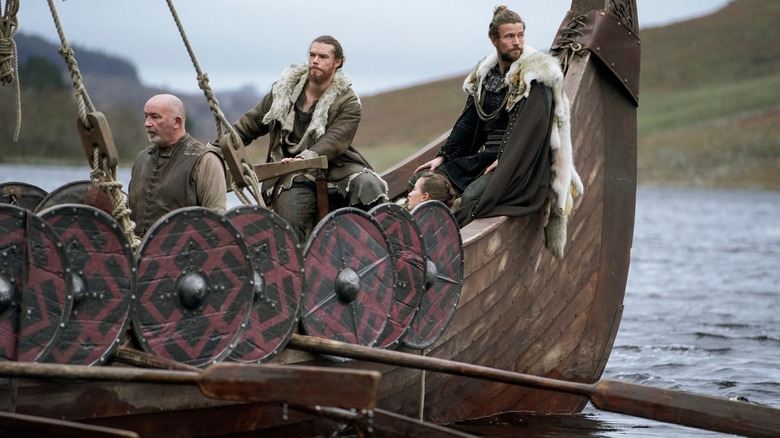
My verdict should be taken with the understanding that I was always predisposed to like "Vikings: Valhalla" -- not just as a fan of the original series, but also because I'm a big history nerd and this a show about my own country's history (a mass grave of Vikings believed to have been killed in the St. Brice's Day massacre was discovered just a few miles from where this review is being written). While "Vikings: Valhalla" season 1 doesn't get off to the same incredible start that the original series did, it whips along engagingly enough that watching it was a breeze, and it's as least as good as the latter seasons of "Vikings," if not more so.
If you're not already invested in Vikings (both as a franchise and as a corner of European history), then you may well find yourself struggling to care whether Olaf or Harald or King Canute or even a passing goat ends up becoming king of the North Sea Empire. But then again, "Vikings" and "Vikings: Valhalla" demonstrate an awareness that becoming a king isn't necessarily good for a person's health, and the people who do become kings generally don't get there in a very meritocratic way. Sure, there was a brief moment of triumph for Ragnar when he first became king, but it quickly became apparent that he was better suited to being a warrior and an explorer than a leader. In "Valhalla," as in the original series, the title of "King" is more of a McGuffin; it's a driving force behind the story and the bloody battles, but it's not the main attraction.
Even if you don't care about the characters at all, "Vikings: Valhalla" is worth watching for its battle scenes alone. When I first learned that the Netflix sequel was in development, I was afraid we'd get Budget Vikings: cheaper-looking costumes, flimsy sets, and less attention to detail. But you can see the love of history all over this show, both in the technical details and in the space it gives to both high-tension politics and elaborate battle scenes. The climactic siege of Kattegatis a gripping watch, thanks in large part to the marrying of the scenes of battle with a rhythmic, beautifully nightmarish score.
Would I return for a second season of "Vikings: Valhalla"? I don't need to lick the Seer's palm to know the answer is "hell, yes!"
"Vikings: Valhalla" premieres Friday, February 25 on Netflix.
Read this next: The 13 Best Comedy Shows On Amazon Prime Right Now
The post Vikings: Valhalla Season 1 Review: You Have My Axe appeared first on /Film.
